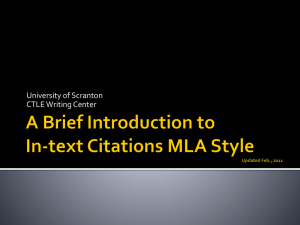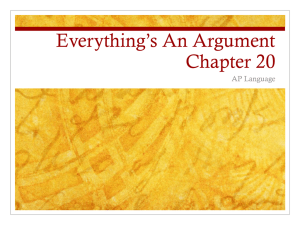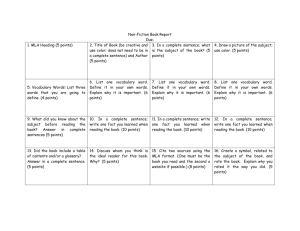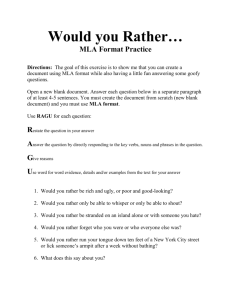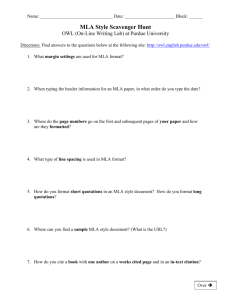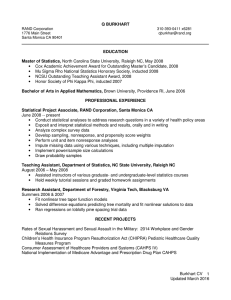MLA in-text Citation
advertisement
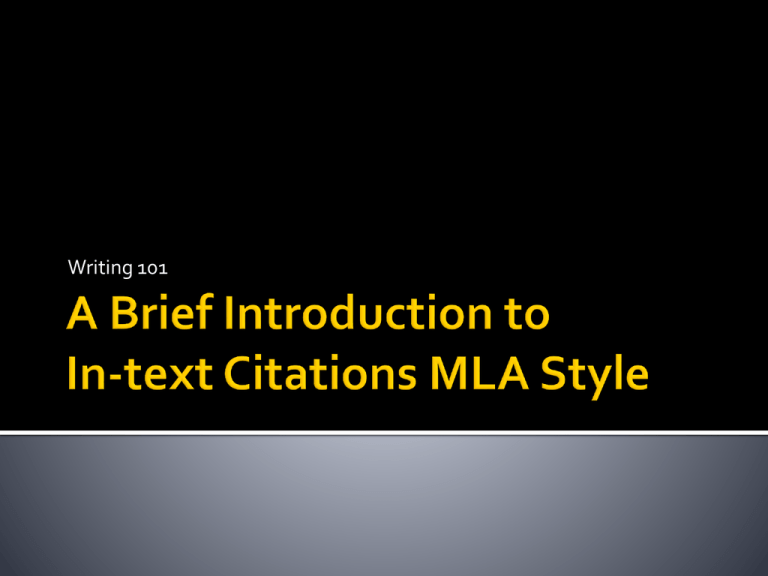
Writing 101 also known as parenthetical documentation. used to cite borrowed words, facts, or ideas at the point they are used in the document. used in conjunction with and not as a replacement for the Works Cited page. In-text citations lead readers to specific works listed on the Works Cited page. Footnotes and endnotes provide readers with the explanatory information: Content notes offer additional comments, information, insight, etc., not provided in the text Bibliographic notes provide information on additional sources or comments on other sources. 1. You use an idea from a source. The idea is not originally yours. It belongs to the author(s) of the source and must be cited. 2. You paraphrase or summarize a source (even if you change the word order and replace words with synonyms). 3. You directly quote a source. 4. You use information that is not common knowledge. For a source with one author: Helpfulness and listening skills are key components of consulting success (Burkhart 6). There should be an entry on the Works Cited Page that corresponds to this in-text citation: Burkhart, Mary. Tips for Writing Consultants. Scranton: Scranton Books, 2008. Print. Place the in-text citation where a pause occurs naturally, for example, before the punctuation that concludes the phrase, the clause, or the sentence containing the borrowed information. The in-text citation used on the previous screen is referred to as author page style to reflect the order of the information within the citation: (Burkhart 6). For a source with no author: Use the title or a shortened version of the title in quotation marks if it is a short work or in italics/underline if it is a long work. (“Working with Student Writers” 6). For a source with two/three authors: Separate last names with any necessary commas and the word “and.” (Burkhart and Smith 6) For a source with four/more authors: Include all last names or include first last name followed by “et al.” (Burkhart et al. 6). For a source with the author named in a signal phrase: Include just the page number. Mary Burkhart reports that effective listening and communication skills are imperative (6). For a source without page numbers: Include just the author’s name. (Burkhart). For an excellent overview or review of the 2009 updates in MLA style and format, click on Purdue University’s MLA Power Point Presentation For one-on-one help using MLA, visit The Writing Center STT 588 D (570) 941-6147 Hacker, Diana and Nancy Sommers. “MLA Papers.” A Writer’s Reference. 7th ed. Boston: Bedford, 2011. 371-428. Print. MLA Handbook for Writers of Research Papers. 7th ed. New York: MLA, 2009. Print. MLA Style Manual and Guide to Scholarly Publishing. 3rd ed. New York: MLA, 2008. Print. Russell, Tony, Allen Brizee, and Elizabeth Angeli. "MLA Formatting and Style Guide." The Purdue OWL. Purdue U Writing Lab, 16 Nov. 2010. Web. 22 Feb. 2011.
